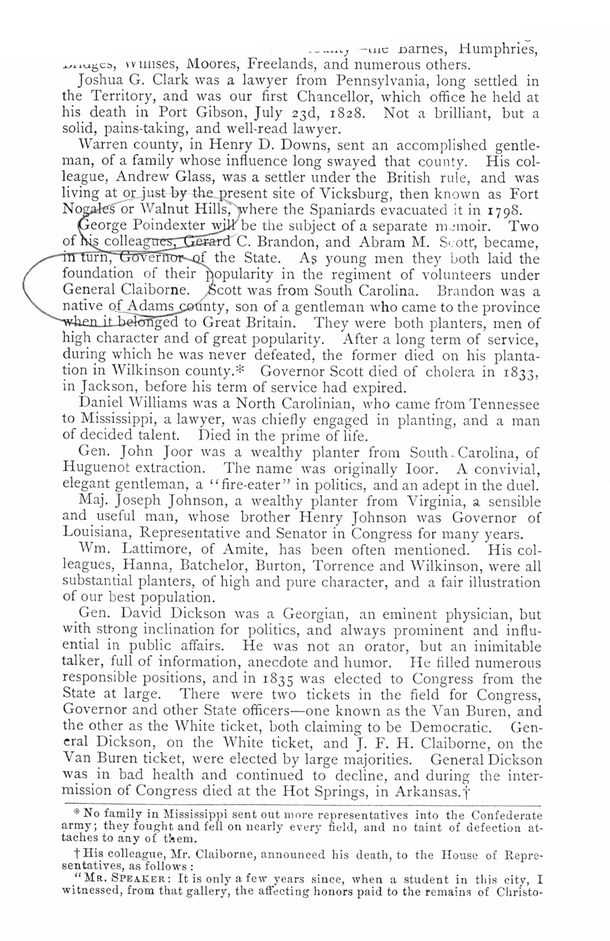This text was obtained via automated optical character recognition.
It has not been edited and may therefore contain several errors.
___-me aarnes, Humphries, ca, w uuses, Moores, Freelands, and numerous others. Joshua G. Clark was a lawyer from Pennsylvania, long settled in the Territory, and was our first Chancellor, which office he held at his death in Port Gibson, July 23d, 1828. Not a brilliant, but a solid, pains-taking, and well-read lawyer. Warren county, in Henry D. Downs, sent an accomplished gentleman, of a family whose influence long swayed that county. His colleague, Andrew Glass, was a settler under the British rule, and was living at or just by the. present site of Vicksburg, then known as Fort Nogaief or Walnut Hills^Vhere the Spaniards evacuated it in 1798. George Poindexterwjlr be the subject of a separate numoir. Two of colIeaguebjjGSrard C. Brandon, and Abram M. S'.otf, became, ?ill turn,' "GoCerntrr^of the State. A$ young men they both laid the foundation of their popularity in the regiment of volunteers under General Claiborne. ^Scott was from South Carolina. Brandon was a native of Adams^gennty, son of a gentleman who came to the province it -b^rrriged to Great Britain. They were both planters, men of high character and of great popularity. After a long term of service, during which he was never defeated, the former died on his plantation in Wilkinson county.* Governor Scott died of cholera in 1833, in Jackson, before his term of service had expired. Daniel Williams was a North Carolinian, who came from Tennessee to Mississippi, a lawyer, was chiefly engaged in planting, and a man of decided talent. Died in the prime of life. Gen. John Joor was a wealthy planter from South. Carolina, of Huguenot extraction. The name was originally loor. A convivial, elegant gentleman, a ?fire-eater? in politics, and an adept in the duel. Maj. Joseph Johnson, a wealthy planter from Virginia, a sensible and useful man, whose brother Plenry Johnson was Governor of Louisiana, Representative and Senator in Congress for many years. Wm. Lattimore, of Amite, has been often mentioned. His colleagues, Hanna, Batchelor, Burton, Torrence and Wilkinson, were all substantial planters, of high and pure character, and a fair illustration of our best population. Gen. David Dickson was a Georgian, an eminent physician, but with stfong inclination for politics, and always prominent and influential in public affairs. He was not an orator, but an inimitable talker, full of information, anecdote and humor. lie filled numerous responsible positions, and in 1835 was elected to Congress from the State at large. There were two tickets in the field for Congress, Governor and other State officers?one known as the Van Buren, and the other as the White ticket, both claiming to be Democratic. General Dickson, on the White ticket, and J. F. H. Claiborne, on the Van Buren ticket, were elected by large majorities. General Dickson was in bad health and continued to decline, and during the intermission of Congress died at the Hot Springs, in Arkansas.y * No family in Mississippi sent out more representatives into the Confederate army; they fought and fell on nearly every field, and 110 taint of defection attaches to any of them. t His colleague, Mr. Claiborne, announced his death, to the House of Representatives, as follows : ?Mr. Speaker: It is only a feiv years since, when a student in this city, I witnessed, from that gallery, the affecting honors paid to the remains of Christo-

Fords Fort Mississippi-Province-Territory-and-State---Page-355